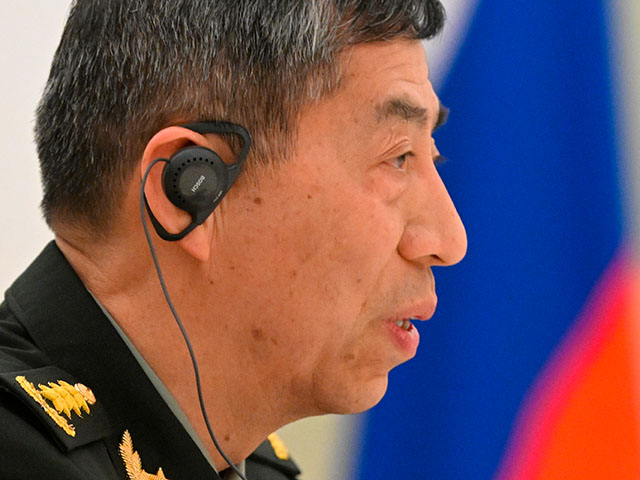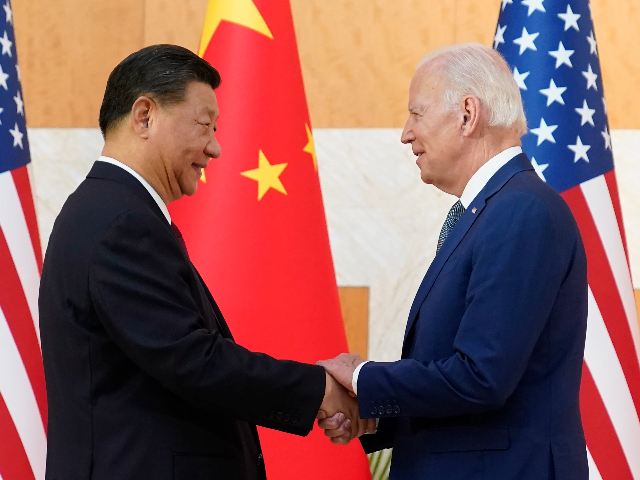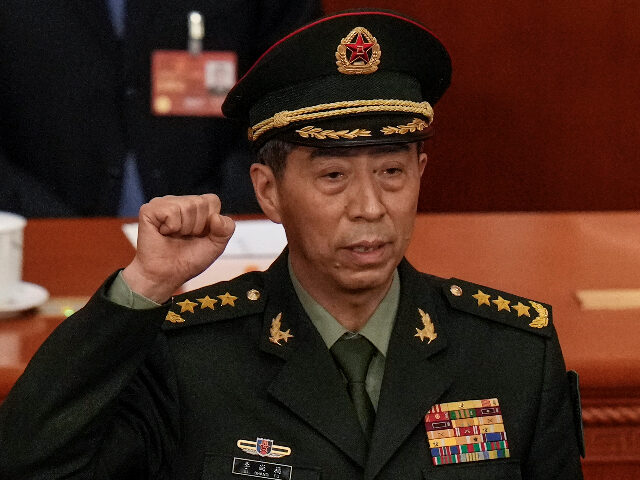The Chinese Communist Party announced through its state media arms on Tuesday that genocidal dictator Xi Jinping had fired now-former Defense Minister Li Shangfu, who had disappeared from the public eye without explanation in August.
Beijing did not announce any replacement for Li, meaning the country currently has no defense minister at the helm of the core military agency. Li also lost his prestigious position in the Chinese State Council, the state-run Global Times announced, and that on the Central Military Commission (CMC).
Li officially held the title for about seven months and is the second recently appointed top minister to vanish for months before being unceremoniously removed from office. Prior to Li, former Foreign Minister Qin Gang abruptly began canceling all public appearances before the Communist Party ousted him from his office, also without explanation, in July. Like Li, Qin lasted seven months on the job, having been only appointed in January. Both Li and Qin were unconventional choices for their respective jobs, believed to have been hand-picked for their posts by Xi. Their disappearance has cast Xi’s decision-making in poor light and suggested that the dictator is engaging in an ongoing purge of his top officials, potentially an expansion of his obsessive attempts to eliminate alleged corruption within the Communist Party.
The Global Times‘s announcement on Tuesday that China no longer had a defense minister included an aside announcing that Qin had lost the last title he retained in the government, that of State Councilor.
“President [sic] Xi Jinping signed a presidential decree Tuesday to remove Li Shangfu as China’s State Councilor and Minister of National Defense, and to remove Qin Gang as State Councilor,” the state outlet announced.
The Global Times gave no clear explanation for Li’s demise but suggested that American sanctions placed on him personally may have contributed to Xi’s decision to strip him of his title.
“When he was in charge of the CMC Equipment Development Department, the administration of then US President Donald Trump sanctioned him and the department in 2018 for purchasing Russian weapons,” the Global Times observed. “The sanction later became a trouble to China-US military exchanges when Li became the Chinese defense minister.”
The state newspaper also remarked upon his vanishing, but claimed that Li had only stopped making “public appearances,” rather than disappeared entirely.

China’s Defense Minister Gen. Li Shangfu speaks to Russian President Vladimir Putin and Russian Defense Minister Sergei Shoigu during their meeting at the Kremlin in Moscow, Russia, on April 16, 2023. (Pavel Bednyakov, Sputnik, Kremlin Pool Photo via AP, File)
The Chinese Foreign Ministry’s English-language transcript of its regular press conference on Tuesday included no mention of the news of Li’s removal from office. The Defense Ministry itself has not at press time published any comment on the matter. The top story on the Defense Ministry’s website on Tuesday was a republication of an article by the state-run Xinhua News Agency summarizing remarks Xi allegedly wrote on “neighborhood diplomacy,” which Qin’s replacement, Foreign Minister Wang Yi, reportedly read at a symposium on Tuesday. The remarks emphasized assurances that East Asia is a peaceful region with little violent conflict.
“Over the past 10 years, China and its neighboring countries have jointly worked to safeguard hard-won peace and tranquility in the turbulent international landscape and build the world’s most dynamic development pacesetter,” the alleged Xi remarks read in part. The remarks did not explain how China would continue to “safeguard hard-won peace” without anyone at the helm of the Ministry of Defense.
The silence from Beijing on the circumstances behind Li’s fall from grace has given rise to significant speculation, most involving allegations of corruption. In September, shortly after Li disappeared, the Reuters news agency reported that anonymous sources believed the Communist Party had launched an investigation into Li regarding “procurement of military equipment.” Similarly, that same month, the Financial Times cited unnamed American sources stating that Washington believed Li was under investigation, though that report did not specify for what reasons.

U.S. President Joe Biden and Chinese President Xi Jinping shake hands before their meeting on the sidelines of the G20 summit meeting, Nov. 14, 2022, in Nusa Dua, in Bali, Indonesia. (AP Photo/Alex Brandon, File)
Japan’s Nikkei Asian Review similarly suggested on Tuesday that Li may have lost his job due to “improprieties in military procurement,” not citing the Reuters report but, rather, statements by the CMC itself announcing an investigation into the department responsible for procuring equipment, which Li had run for six years. In early October, Nikkei reported that China was currently undergoing a “great military purge” made visible by the absence of top military officials, including Li, at ceremonies to mark the anniversary of Mao Zedong’s establishment of Communist China.
Li had risen to the helm of the CMC’s equipment procuring department in 2017, his last job before becoming defense minister and the one for which the U.S. government sanctioned him. The sanctions related to purchases of banned Russian weapons and occurred before he became defense minister — making his appointment in March an apparent sign of defiance against the United States. Prior to his position in weapons procurement, Li served as an aerospace technology expert.
The case of Li’s disappearance differs significantly from that of Qin. While Li’s has been marked by quiet rumors and suggestions of a corruption probe, Qin’s vanishing prompted a torrent of sordid accusations against the former foreign ministry, much of it originating on the Chinese regime-controlled social media site Weibo. Beijing is typically extremely careful to censor all potentially dissident content on Weibo, but allowed users to share hearsay accusing Qin of having an affair with Chinese journalist Fu Xiaotian of PhoenixTV. Some suggested that Fu gave birth to a child from their affair, citing the sudden appearance of an infant on her final social media posts before she, too, disappeared.
Fu interviewed Qin for a profile on PhoenixTV, the last one she publicized online. PhoenixTV made the interview footage private, and thus unavailable, on YouTube after Qin lost his title.

COMMENTS
Please let us know if you're having issues with commenting.